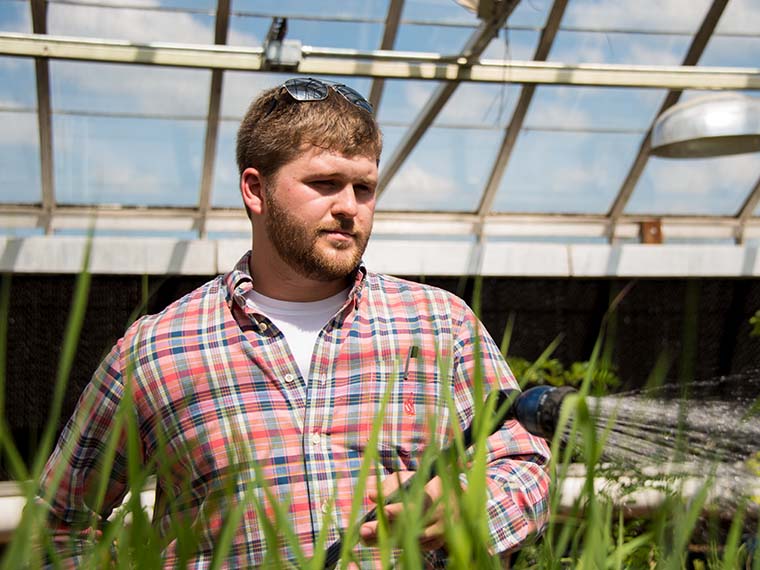The information presented on this page may be dated. It may refer to situations which have changed or people who are no longer affiliated with the university. It is archived as part of Mississippi State University's history.
The word prairie evokes images of wide expanses of wildflowers amidst rolling hills somewhere in the middle of America. Prairie lands and Mississippi are likely miles apart in the minds of many residents and non-residents alike.
However, the state has two prairies: the Blackland Prairie is a crescent-shaped area stretching from Tennessee through East-central Mississippi to Alabama. The Jackson Prairie Belt stretches from Yazoo County, Mississippi to the border of Alabama. In fact, during the early 1800s, nearly one quarter of the state supported patches of prairie. However, prairie land and the unique ecosystem it provides have all but vanished from the Magnolia State.
Brady Dunaway, a junior in environmental science in agricultural systems, is hoping to change that and has been working to restore prairies since he first began college.
The Brookhaven native founded a naturalist club while a student at Copiah-Lincoln Community College. The club restored a savannah prairie nature trail, among other projects, and is still active today.
When Dunaway began his academic pursuits at Mississippi State University, he quickly connected with JoVonn Hill, a research professor in the Department of Biochemistry, Molecular Biology, Entomology, and Plant Pathology. Hill is an expert on the ecosystem, serving as co-author of a prairie restoration and management book for Mississippi landowners.
Dunaway's interest in the ecosystem stems from the biodiversity created within it.
"It is really the unsung song of the south, the grasslands and prairies that were once a prominent part of the state," he said. "It is an obscure habitat. Everyone thinks of the Midwest as having the prairie in the United States but in the Southeast, we also have some very unique prairie ecosystems with very rare species that can be found nowhere else in the world."
Dunaway and Hill are restoring a prairie on the Natchez Trace Parkway at the Black Belt Overlook. Currently, the area is a hay field with non-native exotic grasses. There is a prairie across the parkway.
"We collected seed from the prairie directly across the parkway and germinated them in the greenhouse," Hill said. "We are currently taking inventory of the plants and insect species at the overlook. Park personnel will use herbicides to kill the exotics and then we will plant the native species that have been raised in the greenhouse."
Besides all of the benefits the prairie will provide, it will also serve as a demonstration for the Parkway visitors.
"Prairies support a tremendous amount of biodiversity for plants and wildlife," Dunaway said. "They repair soils, sequester carbon, and filter pollutants through their extensive root systems."
It also gives Dunaway a chance to pursue his passion: restoring the land and recreating an ecosystem.

